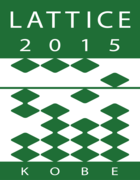Speaker
Mr
Hai-Tao Shu
(Key Laboratory of Quark & Lepton Physics (MOE) and Institute of Particle Physics,Central China Normal University)
Description
All the information of quantum states are encoded in their spectral functions.
The reconstruction of the spectral function from the corresponding Euclidean correlation function is, however, a typical ill-posed problem as an analytic continuation from imaginary time to real time is required. The commonly used Maximum Entropy Method (MEM) is based on the Bayesian interference and its output thus may have bias on the prior information provided in the default models.
We present results using a stochastic approach for the reconstruction of the spectral functions from the Euclidean correlation functions. In this approach the spectral function is parameterized as a sum of randomly distributed boxes. By varying the width, location and the height of the box stochastically an optimal spectral function can be obtained. Using this approach we can reproduce fairly well the mock spectral functions which contain very sharp resonance peaks, transport peaks and continuum spectra. Application to real lattice QCD charmonium correlator data with N_tau=96, 48, 32 and 24 has also been performed and the same conclusion on the dissociation temperature of ground charmonium states as obtained from MEM is obtained.
Primary author
Mr
Hai-Tao Shu
(Key Laboratory of Quark & Lepton Physics (MOE) and Institute of Particle Physics,Central China Normal University)
Co-author
Prof.
Heng-Tong Ding
(Key Laboratory of Quark & Lepton Physics (MOE) and Institute of Particle Physics,Central China Normal University)

